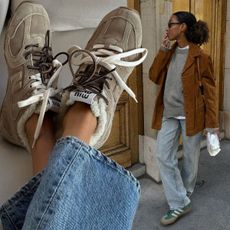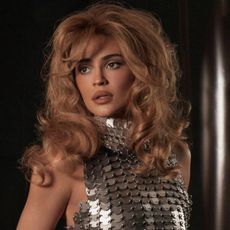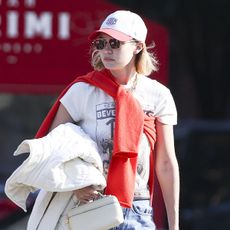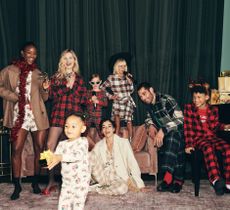This Week in High-Fashion Twitter Drama: Meet the Fashion Girls Versus the Dolls

There are a few inescapable truths in this world: death, taxes, and an unrelenting stream of fashion mess on Twitter.com.
Earlier this month, high-fashion Twitter—a collective of independent journalists, commentators, designers, and students—was set ablaze by commentator Melissa Michelle's viral thread that examines the current world of celebrity styling. Per Michelle (and the dozens of accounts agreeing with her), there are two types of people in this world: fashion girls and fashion dolls.
Here are the CliffsNotes. Dolls are carefully crafted celebrities whose style relies on aesthetic evolution, working alongside talented teams to dress them up in whatever's cutting edge in the industry. You can usually spot a doll from a mile away depending on what her outfit is at the time. It's often something over-the-top and glamorous based on what type of project she's promoting, whether it be an album, a Hollywood blockbuster, or a specific runway collection. Fashion girls, on the other hand, have a curated, authentic interest in fashion history and style that defines their wardrobe choices, no matter how left field they may be.
As of publishing, Michelle's thread has nearly 100,000 views, and the Beyhive is fighting in the replies—a telltale sign of internet success. While there's endless room for interpretation based on what you define as personal style, the message is clear. If given the opportunity, a great team behind any celebrity will eat every time.

"I noticed a pattern of particular [Hollywood] clients being styled in a certain light versus others having more freedom," Michelle explains. You have fashion girls like Zendaya, whose work with Law Roach is essentially a carte blanche to explore her personal style and tastes. On the other hand, Michelle says, you just have to take a look at Margot Robbie's recent press tour to see the alternative. Enter the dolls—both literally and figuratively.
The Aussie actress has taken on a larger-than-life, pinkifed glam-bot persona to market one of the most anticipated theatrical releases of the year. She's an adult woman literally cosplaying as an iconic plastic toy, and frankly, I wouldn't have it any other way.
Just like Robbie's Barbie looks, there's been a growing legion of women who make versatility their selling point. For Michelle, the fantasy of fashion dolls doesn't just lie in their outfits—it lies in the hyper-aspirational, extravagant life they're trying to sell you. Case in point, two of the world's most successful women are the definition of dolls, per Michelle: Beyoncé and Kim Kardashian
"The women considered fashion dolls in my book are playing dress-up. Not a hair is out of place. It's a bit more curated and specific. Even that's a compliment. It's not a drag!" Michelle goes on to say, pulling up her viral Twitter thread when we get on the phone. It's important to note the use of the word "compliment." Given the number of people pressed in Michelle's Twitter replies, the 23-year-old isn't trying to get herself in any more internet beef with messy stans.
In today's hyper-evolving, digital-first world, she has a point. A celebrity or influencer who can easily adapt to certain aesthetics and eras is quite a successful one, especially if they're convincing enough to sell you on a rebrand. Jennie from Blackpink, one of the dolls Michelle particularly admires, went from 2010s-era dip-dyed hair and neon arm warmers to being the poster child for Virginie Viard's romance-fueled Chanel. If that isn't range, I don't know what is.

"There's a polished aspect [of dolls], where you want to present yourself a certain way. It works perfectly for some people for marketing purposes," Michelle says. Just look at Beyoncé's recent costumes, for example, on her Renaissance World Tour. The singer has taken up futuristic, chrome, and surrealist fashion elements to enhance her disco house–infused concert experience, aided by stylists Shiona Turini, KJ Moody, and Julia Sarr-Jamois.
Marketability and fashion can only get you so far, especially when trying to make an outfit look more like a choice and not a paid campaign. Sometimes, Michelle suggests, it's important for stylists to acknowledge their client's personal preferences in a thoughtful way. If not, they can start to feel like a walking ad. "I'm sure even some stylists have deals with brands [telling their clients] you have to wear this with the bag, the shoes, the sunglasses, and you can't switch anything up. It's an unfortunate case," she says.
There have been times when I've gotten on the internet and felt that the heydey of well-crafted starlet styling happened years ago when glitz and glamor on red carpets corresponded more with personal choices rather than contractual obligations. Although some celebrities may only have a list of garments they can pull from a show based on their partnerships, the most versed stylists are able to craft a look that feels fresh and authentic to the talent they're working with. In the case of Gen Z–focused stylist Tabitha Sanchez, a star's accessories, hair, and makeup can really showcase their true personality.
"In an ideal world, everyone can mix and match and have fun and really showcase their personal style, but the conversation is a lot more nuanced than that. [The dolls showcased] are being dressed by designers for particular events," Sanchez tells Who What Wear. She's a fan of the Twitter thread, though. "Whenever clients of mine have to wear a particular designer, I like to have them look at the runway show or lookbooks as well to see what stands out to them, and then I'll do the same, and we'll see where we overlap and go from there," she says.

Unsurprisingly, when talking to Sanchez, I learn that the majority of her clients take inspiration from the other side of the aisle, the fashion girls that Michelle referred to in her viral thread. "My clients almost always have the same style references: Bella Hadid, Sav Hudson, Linmick, Chloe Cherry—cool girls who, when you look at their outfits, always have something a little off that doesn't make sense, but they just make it work," Sanchez explains. Men's boxers as shorts, hot pink feather-trimmed jackets, and gas-station sunglasses are all on the menu. "I've learned the hard way that there's aspirational versus attainable and realistic. Those girls are all what I'd call true fashion girls who really just wear whatever they want."
The age-old tale of the zany, sexy, weird-dressed starlet isn't a product of a social media age, although it feels like it. Ever since the counterculture movements of the late '60s, radical female style has been something that women pick for themselves rather than for the eyes of men. Back then, it translated to miniskirts and rocker bedhead. Today, it's archive Mugler and satin granny panties (often still paired with miniskirts). The more things change… as they say.
Whether or not a fashion girl actually works with stylists, you can tell that her bottom line is simply caring about the clothes. As Michelle puts it in her Twitter thread and Clothes Minded Substack newsletter, these women are the actual ones to watch for: "A real fashion girl can mix her personal style with avant-garde pieces and even couture while still maintaining her personal identity. In fact, that is the leading factor in their wardrobe choices." The poster children behind the movement? Dua Lipa, Zendaya, and Chloë Sevigny to name a few. But let's be honest. There's no one better than Rihanna.

The multi-hyphenate has been everyone's favorite front-row staple since early on in her career, teaming up with stylist and Interview Magazine Editor in Chief Mel Ottenberg and later Jahleel Weaver to take her to the next level. In the eyes of Michelle, Rihanna is the blueprint of what it means to be a fashion girl. The Barbados native's genuine style blends seamlessly with her personality. It's never felt like a farce put on for shock value when Rihanna walks out of her apartment with jeans three sizes too big or a giant red heart—it just feels like her.
"[Fashion girls] could put together anything that comes to their imagination and make it their own and make it really fun and exciting," Michelle explains. She goes on to reference new-age supermodels Paloma Elsesser and Anok Yai: "They mix and match themes so effortlessly. If you're someone that can put on a fur coat, some boots, and a pair of cute vintage Tom Ford pants, you're that girl."
While the obvious way to differentiate the two groups is whether or not they're working with a stylist on a daily basis, it's also vital to acknowledge fashion girls, for the most part, know where their clothes are coming from. For most of the figures in the latter camp, it's largely because they live and breathe fashion. "If they're on a red carpet and have answers to questions like 'Where does this gown come from?' or 'What's the story behind it?' they know their stuff," Michelle adds. It's not enough to be dressed from head to toe in an archival look; you have to realize the significance too.
For the last few years, a magnifying glass has been held up to the evolving world of client-stylist-brand relationships, with every year promising an exciting rebrand of one of our favorites. Anne Hathway, Jennifer Lawrence, Cardi B, and Hailey Bieber are all women whose increased style relevancy has come from a well-connected team providing their clients with the latest and greatest in the fashion industry—whether it be via brand partnerships or otherwise. You can debate who fits into either category easily, but at the end of the day, stylists and their A-list clients are simply working within a framework of fast-paced aesthetic choices. One day you're in, and the next you're out, and all that's left to wonder is the following. If a celebrity's style is manufactured by a well-resourced team and millions of dollars, does it really count as a reflection of a star's great taste? Maybe.
Michelle puts it best at the end of our call: For celebrities, a win is a win, and a bag is a bag. Is there anything more to being a fashion girl or doll than sitting around with the world's best garments at your feet, thinking about what you want to wear next? If only we could all be so lucky.
-
 Is It Just Me, or Is Every Stylish Woman in L.A. and NYC Wearing This Elegant Bag Color?
Is It Just Me, or Is Every Stylish Woman in L.A. and NYC Wearing This Elegant Bag Color?Sorry, black bags.
By Nikki Chwatt
-
 Forget Bombers—Stylish Women in L.A. and Paris Much Prefer This Elegant Jacket Trend
Forget Bombers—Stylish Women in L.A. and Paris Much Prefer This Elegant Jacket TrendJennifer Lawrence included.
By Eliza Huber
-
 J.Law! Kendall! Laura! It Girls Are in Agreement About This Luxurious Fall Shoe Trend
J.Law! Kendall! Laura! It Girls Are in Agreement About This Luxurious Fall Shoe TrendComfort, meet style.
By Eliza Huber
-
 The Rich-Looking Sneaker Trend That's Set to Dominate in 2025
The Rich-Looking Sneaker Trend That's Set to Dominate in 2025Wealth's the word.
By Anna LaPlaca
-
 Kim Kardashian Just Wore Princess Diana's Necklace—Here's the Full Backstory on the Royal Jewel
Kim Kardashian Just Wore Princess Diana's Necklace—Here's the Full Backstory on the Royal JewelIt has a fascinating history.
By Iris Goldsztajn
-
 Kylie Jenner Just Wore Her Most Risqué Halloween Costume to Date
Kylie Jenner Just Wore Her Most Risqué Halloween Costume to DateShe bared it all.
By Nikki Chwatt
-
 Olivia Rodrigo and Kim K. Just Wore the Shoe Trend I Thought Was Over for Good
Olivia Rodrigo and Kim K. Just Wore the Shoe Trend I Thought Was Over for GoodI was wrong.
By Eliza Huber
-
 The Simple Styling Trick Dakota Johnson and J.Law Use to Make Their Outfits Look More Expensive
The Simple Styling Trick Dakota Johnson and J.Law Use to Make Their Outfits Look More ExpensiveIt's truly so simple.
By Nikki Chwatt

